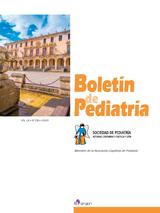Fenotipos conductuales: revisión de algunos síndromes no habitual
R. Cancho-Candela , P.A. Conde Guzón , C. Escribano García , F. Centeno Malfaz
Bol. Pediatr. 2019; 59 (250): 277 - 282
Introducción Se denomina fenotipo conductual (FC) a la conducta y perfil cognitivo asociados de modo específico a un síndrome, habitualmente de origen genético. Desarrollo Numerosos síndromes clásicos muestran FC asociados bien conocidos en la bilbliografía, pero existen síndromes menos conocidos que presentan FC característicos. Los FC muestran habitualmente la presencia de discapacidad intelectual y/o trastorno de espectro autista, con adición de neuroconducta y déficits neuropsicológicos específicos. Existe un número creciente de diagnósticos de síndromes genéticos con patología de neurodesarrollo debido a la difusión de técnicas de estudio como los CGH-arrays y la secuenciación masiva. El estudio de genes críticos y mutaciones específicas para establecer el correlato genotipo-fenotipo conductual en cada síndrome puede ser complicado. Se revisan diversos síndromes con FC característicos poco citados en la bibliografía, con correlatos genotipo-fenotipo interesantes y paradigmáticos. Conclusiones El FC ha perdido parte del valor diagnóstico que tenía en la época previa a la difusión de las técnicas de diagnóstico genético, pero mantiene un importante valor dentro del pronóstico y manejo individualizado.
Behavioral phenotypes: review of some uncommon syndromes
Introduction The behavior and cognitive profile specifically associated with a syndrome, usually of genetic origin, is called behavioral phenotype (BP). Development Many classic syndromes show wellknown associated BP in the bibliography, but there are less known syndromes that have characteristic BP. These BP usually show the presence of intellectual disability and/or autism spectrum disorder, with addition of neurobehavior and specific neuropsychological deficits. There is an increasing number of diagnoses of genetic syndromes with neurodevelopmental pathology due to the diffusion of study techniques such as arrays CGH and massive sequencing. The study of critical genes and specific mutations to establish the behavioral phenotype-genotype correlate in each syndrome can be complicated. We review various characteristic BP syndromes that are poorly cited in the bibliography, with interesting and paradigmatic genotype-phenotype correlates. Conclusions BP has lost part of the diagnostic value that it had in the days prior to diffusion of genetic diagnostic techniques, but it maintains an important value within prognosis and individualized management
Artículo completo (PDF) (89 kb.)
- Otros
